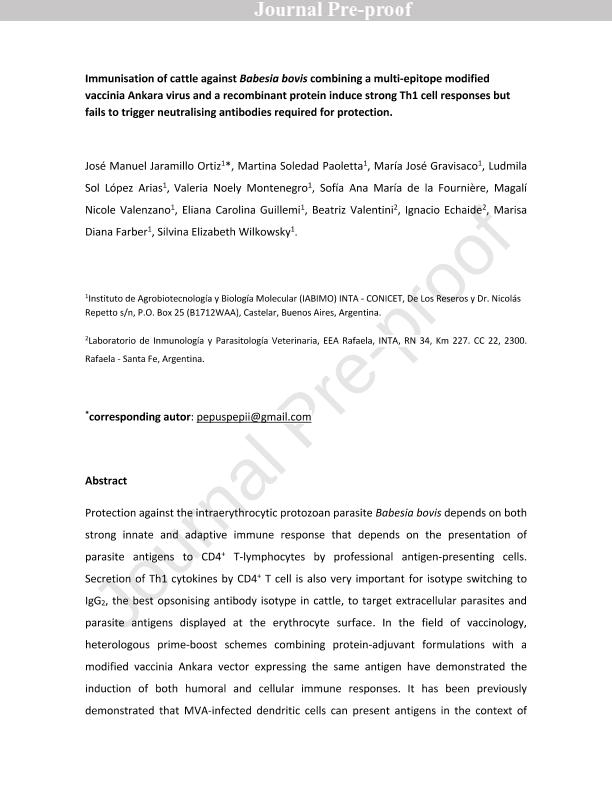Artículo
Immunisation of cattle against Babesia bovis combining a multi-epitope modified vaccinia Ankara virus and a recombinant protein induce strong Th1 cell responses but fails to trigger neutralising antibodies required for protection
Jaramillo Ortiz, José Manuel ; Paoletta, Martina Soledad; Gravisaco, Maria Jose Federica
; Paoletta, Martina Soledad; Gravisaco, Maria Jose Federica ; López Arias, Ludmila Sol
; López Arias, Ludmila Sol ; Montenegro, Valeria Noely
; Montenegro, Valeria Noely ; de la Fourniere, Sofía Ana María
; de la Fourniere, Sofía Ana María ; Valenzano, Magali
; Valenzano, Magali ; Guillemi, Eliana Carolina
; Guillemi, Eliana Carolina ; Valentini, Beatriz; Echaide, Ignacio Eduardo; Farber, Marisa Diana
; Valentini, Beatriz; Echaide, Ignacio Eduardo; Farber, Marisa Diana ; Wilkowsky, Silvina Elizabeth
; Wilkowsky, Silvina Elizabeth
 ; Paoletta, Martina Soledad; Gravisaco, Maria Jose Federica
; Paoletta, Martina Soledad; Gravisaco, Maria Jose Federica ; López Arias, Ludmila Sol
; López Arias, Ludmila Sol ; Montenegro, Valeria Noely
; Montenegro, Valeria Noely ; de la Fourniere, Sofía Ana María
; de la Fourniere, Sofía Ana María ; Valenzano, Magali
; Valenzano, Magali ; Guillemi, Eliana Carolina
; Guillemi, Eliana Carolina ; Valentini, Beatriz; Echaide, Ignacio Eduardo; Farber, Marisa Diana
; Valentini, Beatriz; Echaide, Ignacio Eduardo; Farber, Marisa Diana ; Wilkowsky, Silvina Elizabeth
; Wilkowsky, Silvina Elizabeth
Fecha de publicación:
10/2019
Editorial:
Elsevier
Revista:
Ticks and Tick-borne Diseases
ISSN:
1877-959X
Idioma:
Inglés
Tipo de recurso:
Artículo publicado
Clasificación temática:
Resumen
Protection against the intraerythrocytic protozoan parasite Babesia bovis depends on both strong innate and adaptive immune response, this latter involving the presentation of parasite antigens to CD4+ T-lymphocytes by professional antigen-presenting cells. Secretion of Th1 cytokines by CD4+ T cell is also very important for isotype switching to IgG2, the best opsonising antibody isotype in cattle, to target extracellular parasites and parasite antigens displayed at the erythrocyte surface. In the field of vaccinology, heterologous prime-boost schemes combining protein-adjuvant formulations with a modified vaccinia Ankara vector expressing the same antigen have demonstrated the induction of both humoral and cellular immune responses. It has been previously demonstrated that MVA-infected dendritic cells can present antigens in the context of MHC II and activate CD4+ T cell. These results support the use of the MVA viral vector for a pathogen like Babesia bovis, which only resides within erythrocytes. In this study, 13–15-months-old Holstein-Friesian steers were immunised with a subunit vaccine as a prime and a modified vaccinia Ankara vector as a boost, both expressing a chimeric multi-antigen (rMABbo – rMVA). This antigen includes the immunodominant B and T cell epitopes of three B. bovis proteins: merozoite surface antigen - 2c (MSA - 2c), rhoptry associated protein 1 (RAP - 1) and heat shock protein 20 (HSP20). Responses were compared with the Babesia bovis live attenuated vaccine used in Argentina (R1A). Eleven weeks after the first immunisation, all bovines were challenged by the inoculation of a virulent B. bovis strain. All groups were monitored daily for hyperthermia and reduction of packed cell volume. Both the rMABbo – rMVA and R1A vaccinated animals developed high titters of total IgG antibodies and an antigen-specific Th1 cellular response before and after challenge. However, all rMABbo – rMVA steers showed clinical signs of disease upon challenge. Only the R1A live vaccine group developed an immune response associated with in vitro neutralising antibodies at a level that significantly inhibited the parasite invasion. The lack of protection observed with this recombinant formulation indicates the need to perform further basic and clinical studies in the bovine model in order to achieve the desired effectiveness. This is the first report in which a novel vaccine candidate against Babesia bovis was constructed based on a recombinant and rationally designed viral vector and evaluated in the biological model of the disease.
Archivos asociados
Licencia
Identificadores
Colecciones
Articulos (IABIMO)
Articulos de INSTITUTO DE AGROBIOTECNOLOGIA Y BIOLOGIA MOLECULAR
Articulos de INSTITUTO DE AGROBIOTECNOLOGIA Y BIOLOGIA MOLECULAR
Citación
Jaramillo Ortiz, José Manuel; Paoletta, Martina Soledad; Gravisaco, Maria Jose Federica; López Arias, Ludmila Sol; Montenegro, Valeria Noely; et al.; Immunisation of cattle against Babesia bovis combining a multi-epitope modified vaccinia Ankara virus and a recombinant protein induce strong Th1 cell responses but fails to trigger neutralising antibodies required for protection; Elsevier; Ticks and Tick-borne Diseases; 10; 6; 10-2019
Compartir
Altmétricas



